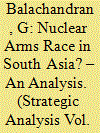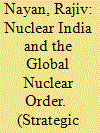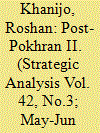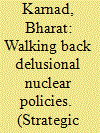| Srl | Item |
| 1 |
ID:
159004


|
|
|
| 2 |
ID:
159006


|
|
|
| 3 |
ID:
158999


|
|
|
|
|
| Summary/Abstract |
For a decade after the Cold War it seemed that multilateral governance might take root under US leadership, including a reinvigorated United Nations and a strengthened international legal framework. The nuclear explosive devices tested by India in 1998 took place in a pivotal period when the so-called ‘unipolar moment’ of the US began to be challenged by states that were not satisfied such an arrangement could advance their national interests.
|
|
|
|
|
|
|
|
|
|
|
|
|
|
|
|
| 4 |
ID:
159002


|
|
|
| 5 |
ID:
159005


|
|
|
| 6 |
ID:
159001


|
|
|
|
|
| Summary/Abstract |
The 1998 nuclear tests conducted by India heralded yet another nuclear age. The instant response of a section of the international community was highly pessimistic. It foresaw regional instability, collapse of the global nuclear order and serious crisis in the global nuclear non-proliferation regime. As a result, overlooking India’s security imperatives, a number of countries reacted with hostility against the Indian nuclear tests. Even international organisations were mobilised against India. However, the two decades of India’s nuclearisation appear to have falsified the prediction of doomsayers. On the contrary, India has assumed the mantle of stabilising the global nuclear order and enhancing its own security in the process. Although it has not joined the Nuclear Non-Proliferation Treaty (NPT), it has accepted the norms of non-proliferation. It is promoting non-proliferation and has joined different institutions associated with it. Concurrently, the international community has also started integrating and accommodating India in the global nuclear order in general and the non-proliferation regimes in particular.
|
|
|
|
|
|
|
|
|
|
|
|
|
|
|
|
| 7 |
ID:
158998


|
|
|
|
|
| Summary/Abstract |
Was the 1998 Pokhran test a historical watershed as many contemporary observers believed? This article looks at its impact on the nuclear non-proliferation regime, regional security, India’s position in global institutions, and the ongoing global power shift: the non-proliferation regime continued along the old dispute lines; regional conflict behaviour did not change at all; India grew into global institutions not because of nuclear tests but because of her remarkable economic development; the re-arrangement of global power follows more basic trends as well. The only tangible effect of the Pokhran test was to change India’s exposition to nuclear blackmail from improbable to impossible, not unimportant but still marginal.
|
|
|
|
|
|
|
|
|
|
|
|
|
|
|
|
| 8 |
ID:
159000


|
|
|
|
|
| Summary/Abstract |
Post-Pokhran II the global nuclear environment has changed both in terms of developing niche technologies as also the nuclear strategies. Apart from the traditional challenges, there are new threats emerging in the form of cyber, space, hypersonic glide vehicles, nuclear terrorism, etc. The development of multiple nuclear dyads and triads further makes the security environment increasingly complex, as nations now have to deal with multiple nuclear problems and adversaries. While India has continued its progress in the nuclear domain since 1998, focused critique is necessary to ensure that India’s posture remains relevant and efficient in safeguarding sovereign interests. This article, thus, tries to analyse some of these issues and recommends that India needs to review its nuclear doctrine.
|
|
|
|
|
|
|
|
|
|
|
|
|
|
|
|
| 9 |
ID:
159003


|
|
|
| 10 |
ID:
158997


|
|
|
|
|
| Summary/Abstract |
India’s ‘dual use’ nuclear policy has been strung out from the beginning between the peaceful atom and military atom as illustrated in Jawaharlal Nehru’s use of the phrase for the country’s nuclear energy programme—‘Janus-faced’. However, the Indian Government has been too influenced by its own rhetoric of peaceful use to equally emphasise the security aspects that the phrase implied.
|
|
|
|
|
|
|
|
|
|
|
|
|
|
|
|